The Amazing, Fun and Downright Zany Gadgets at CES 2024
Check out some of the more amazing, fun, useful and zany AI-powered products at the world’s largest consumer electronics trade show
.jpg?width=850&auto=webp&quality=95&format=jpg&disable=upscale)
At heart, CES is a gadgets show. And it is proud of it: A wall chronicling the history of CES at the Las Vegas Convention Center showcases the many consumer electronics devices that made their debut at the trade show – gadgets that eventually became household items.
From the VCR to Blu-ray Discs and connected TVs, CES has been the launching pad for these popular products. For 2024, the central theme of the show is AI. Here are some of the more amazing, fun, useful and zany AI-powered products at the world’s largest consumer electronics trade show.
Meta Ray-Ban Smart Glasses
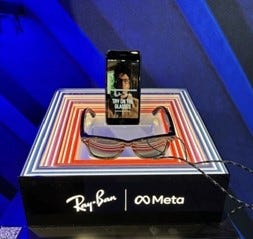
AI Business got to try the new Ray-Ban Meta Smart Glasses. They look like a normal pair of shades, albeit slightly heavier and just a smidge thicker to make space for the electronics. The glasses connect to your smartphone via Bluetooth to get online. By clicking a button on the right side, users can take a photo, shoot a 60-second 1080p video and even live-stream. However, wearers need to keep their heads still when taking photos or the image comes out blurry. It has a 12-megapixel camera but there is no way to zoom in or out.
Users can also listen to music via small speakers in the glasses and the audio cannot be heard by people around you, unless the sound is cranked up. AI Business sidled up to a representative from Ray-Ban parent EssilorLuxottica who was wearing the glasses and listening to music to see if we could hear any sound. We could not even inches away from the glasses. Users can also make calls using the glasses as they have a microphone. They can also send text messages, use voice commands and do online searches using Meta’s new AI assistant, Meta AI, by saying: “Hey Meta.”
It is a neat gadget to have but most of its tasks can be done better by your smartphone; a smartwatch also has many of the same capabilities and then some. However, two things might entice the techie: the device has an ‘off’ switch for when you just want to use them as regular glasses and the charging case comes in the iconic Ray-Ban design. Prices start at $299.
GUIDi for the visually impaired
Another neat AI-powered gadget comes from a Hong Kong startup called AI Guided, which makes a GPS-enabled belt that helps the visually impaired navigate their surroundings independently.
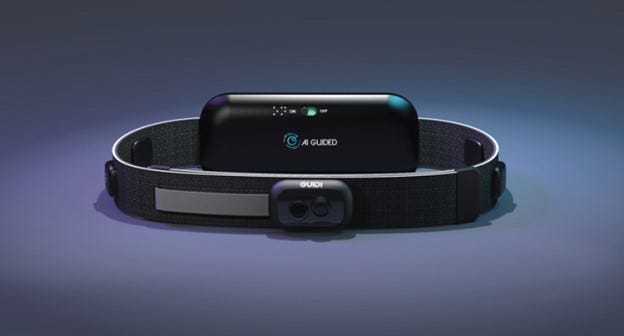
Cameras in the front scour the surroundings for obstacles and a vibration motor in the back alerts the user to objects along the path. It uses computer vision, a subset of AI, and an AI model trained to identify objects to continuously analyze the surroundings for obstacles.
StyleBot, a Samsung-supported startup
Many people could use a personal stylist. StyleBot takes it to the next level: it digitizes the entire process and even infuses it with generative AI. Introduced at CES as one of the startups supported by Samsung, StyleBot aims to take the guesswork out of putting together outfits.
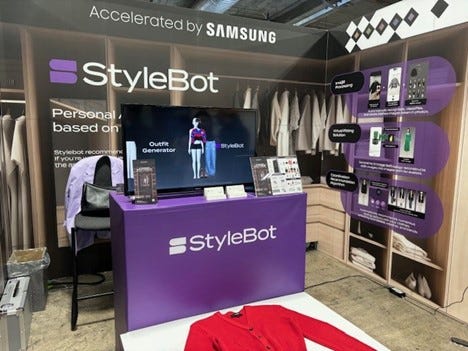
Users take a photo of each piece of clothing, shoes or accessories they own. The photos are stored, analyzed and matched into outfits to inspire the wearer. The startup also claims to use generative AI: using an avatar of the user, the system uses the photo of an item and then generates it onto the avatar. Whether it is truly generative AI is questionable, since it is not supposed to copy an item exactly, it is supposed to create a new item.
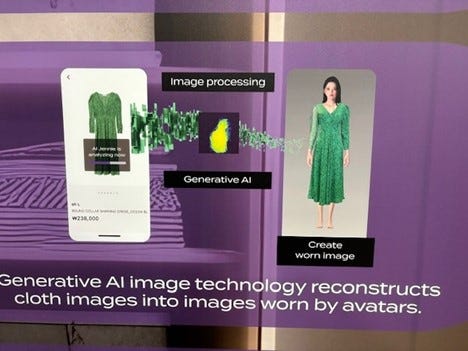
NuviLab’s AI food scanner
AI for good is always commendable. NuviLab from South Korea aims to reduce food waste by using food scanners that analyze the amount of leftover food and recommend to kitchens the optimal amount of food to prepare. It not only saves money but also cuts down on food waste.
Its AI Food Scanner comes in three versions: regular, Pro and Air. The original scanner is used in school cafeterias to track the food left over on plates. It tracks the nutrition consumed by the student, which is compiled into a report for the school.
The Pro and Air both track leftover food in professional kitchens to see what is less popular so the kitchen can optimize its buying of ingredients to reduce food waste and save money. The Air scans plates with leftover food on a conveyer belt while the Pro is installed in kitchens.
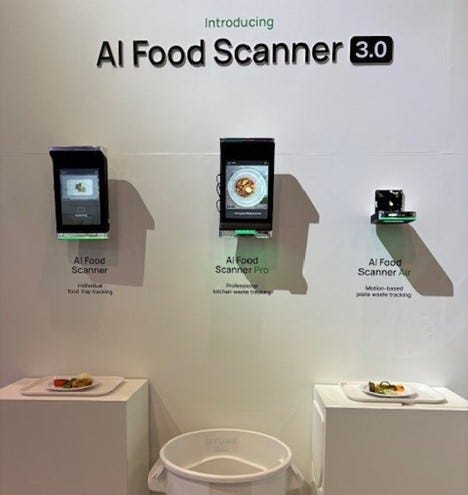
AI backpack from Ayi Tech
A Seattle-based company has infused generative AI into the lowly backpack. The AI Backpack from Ayi Tech lets users generate their own designs, which are then displayed on the backpack in lights. The company uses the ChatGPT API in its app to enable this capability.
In the app, users type a prompt of an image they would like to see on their backpack – for example, a picture of a dog – and once the image is generated, they can upload it to the backpack. AI Business saw a demonstration of the process; the images were not high resolution and can be hit or miss. Video capability is coming. Prices start at $199.
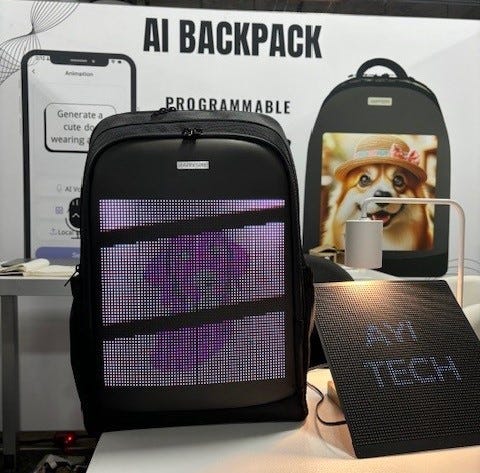
Read more about:
ChatGPT / Generative AIAbout the Author(s)
You May Also Like


.jpg?width=700&auto=webp&quality=80&disable=upscale)
.jpg?width=700&auto=webp&quality=80&disable=upscale)
.jpg?width=700&auto=webp&quality=80&disable=upscale)
.jpg?width=300&auto=webp&quality=80&disable=upscale)
.jpg?width=300&auto=webp&quality=80&disable=upscale)
.jpg?width=300&auto=webp&quality=80&disable=upscale)
.jpg?width=300&auto=webp&quality=80&disable=upscale)
.jpg?width=300&auto=webp&quality=80&disable=upscale)